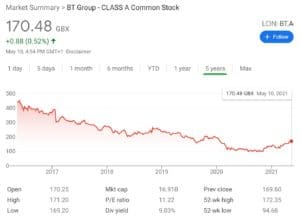How to Buy BT Shares Online in the UK
British Telecom (BT) is a major telecommunications company that has vested interests in several sectors. This covers fixed-line telephones, internet services, and TV subscription. The firm is listed on the London Stock Exchange, and it has historically paid dividends twice per year. However, BT has since suspended its dividend policy until 2021 as per the COV-19 pandemic.
In this guide, we show you how to buy BT shares online in the UK. We also walk you through the process of choosing a suitable broker, and give you some handy information on whether or not BT shares represent a viable investment.
-
-
1. IG – Trusted UK Share Dealing Platform With Competitive-Fees
 IG is a notable option for those of you that want access to a substantial stock library. This is because the platform hosts over 10,000 shares. In the UK, this covers both the London Stock Exchange and AIM. As such, you can buy BT shares at the click of a button. You can also buy shares in international firms. This covers heaps of foreign marketplaces which is great for diversification purposes.
IG is a notable option for those of you that want access to a substantial stock library. This is because the platform hosts over 10,000 shares. In the UK, this covers both the London Stock Exchange and AIM. As such, you can buy BT shares at the click of a button. You can also buy shares in international firms. This covers heaps of foreign marketplaces which is great for diversification purposes.IG also offers a fully-fledged CFD stock trading and spread betting facility. This allows you to trade BT shares with leverage. For example, at 1:5 – a £300 account balance would allow you to enter a buy or sell position worth £1,500. When it comes to fees, IG charges £8 per trade when buying BT shares. If you are able to trade more than 3 times per month, this goes down to £3. CFD fees are slightly different, as you will pay a variable rate of 0.10% (minimum £10).
On top of its cost-effective pricing structure and huge stock library, IG is notable in the regulation department. This is because the platform holds multiple brokerage licenses, including that of the FCA. It was launched way back in 1974, and its parent company is listed on the London Stock Exchange. You can get started with a minimum deposit of £250. IG supports several payment methods, including debit/credit cards and a bank transfer.
Pros:
- FCA Regulated UK broker with a long-standing reputation
- Good value share dealing services
- Leverage and short-selling also available
- Spread betting and CFD products
- Access to UK and international markets
- Great research department
Cons:
- Minimum deposit of £250
- US stocks have a $15 minimum commission
Step 2: Research BT Shares
So now that we have discussed some of the best UK brokers to buy BT shares with, the next step is to perform some in-depth research. After all, you need to have a birds-eye view of whether or not BT represents a good investment. This is especially the case during times of economic uncertainties as per COV-19, whether you’re investing in BT or other British companies like Tesco or Royal Mail.
BT Share Price History
BT is a UK-based telecommunication company that is active in over 180 nations. The firm was originally focused on fixed-line telecommunications, before diversifying into several new-age sectors. This now includes consumer and business internet services, mobile telecommunications, fibre broadband, and TV content.
BT was owned by the British public before its 1984 IPO. Its public listing on the London Stock Exchange subsequently priced BT shares at 130p each. This gave the company an initial valuation of £7.8 billion. Since then, it’s been somewhat of a rollercoaster ride for the telecommunications giant. For example, the shares went on an upward trajectory that lasted almost 15 years.
But, BT peaked in 1999 with a share price of just over 1,000p. Unfortunately for stockholders, BT shares are now worth just a fraction of their 1999 highs. At the time of writing in May 2021, the BT share price is just 170p. This gives BT a market capitalization of £16.9 billion.
BT shares started 2020 at 184p and the stock was looking to be in good shape until the COVID-19 pandemic hit. The shares hit a low of 94p and hovered around 100p through October. However, the shares have since recovered to 170p.
BT Shares Dividend Information
BT has historically been a good portfolio addition to those that seek regular dividend payments. However, the firm recently announced that it would be putting a stop to dividends until at least 2021. This is unwelcome news for investors and this has been reflected in the BT share price. With this in mind, your main focus will be on increasing the size of your investment through capital gains.
Should I Buy BT Shares?
BT shares are worth just a fraction of their prior all-time highs. This doesn’t mean that the stocks aren’t worth considering. On the contrary, there is much to like about BT as an organization.
You should, however, explore both the good and bad points of a company before parting with your funds – so below you will find some useful information on where the shares are likely to go in both the short and long run.
Current Prices Offer a Bargain Purchase
At a current price level of just above 170p, BT shares are relatively cheap. As we covered earlier, the shares were priced at over 184p before the coronavirus-related market sell-off that occurred in March. While the 8% difference might seem relatively small, that’s a nice profit for investors if BT can close that gap. Looking at BT’s wider business successes, a price target of 200p is potentially in sight in the medium-term.
COVID-19 Restrictions Beyond the Control of BT
It is important to understand why the markets reacted the way they did with BT shares. First and foremost, BT engineers that were tasked with visiting consumer households to install its broadbands services were unable to once the lockdown restrictions came to place.
Then, its other core division – BT Sports, was also hit hard by the restrictions that forced the Premier League to shut its doors. This subsequently resulted in a loss of interest from consumers and thus – cancelled subscriptions. Both of these reasons are beyond the control of BT, which is why many would argue its shares are undervalued at the 100p-mark.
As the pandemic comes to an end in the UK, these issues will no longer hurt BT’s business. That goes a long way towards explaining the share price’s recent recovery, but investors appear to still be treading cautiously.
View BT as a Long-Term Buy and Hold
BT controls the lion’s share of the UK telecommunications space. So, an investment in BT shares should be viewed as a long-term buy and hold. The UK will always need telecommunications, and demand for broadband and broadcasting is only increasing. We think BT is poised to grow steadily for many years to come.
Pre-COV-19 Woes
Although the future could be bright for BT shares, it is important to note that its stock price downfall started long before the COV-19 pandemic. For example, five years prior to writing this piece, BT shares were priced at 465p.
There are also concerns regarding BT’s mounting debt levels. In response to this, BT joined dozens of other FTSE 100 companies by announcing a dividend suspension earlier in the year. It went as far as saying that it does not expect dividends to return until at least 2021. The firm can, however, utilize the savings it makes by reducing its exposure to debt.
BT Shares Buy or Sell
We believe that investors should buy BT and hold these shares for the long term. BT is the dominant company in the UK telecommunications sector, and that gives the company a huge amount of control.
In the near term, BT shares appear to be undervalued. The shares are priced 8% below where they were prior to the COVID-19 pandemic, despite the fact that all its operations are coming back online. BT could even see more profitability in the future as the shift to remote work encourages people to buy higher internet speeds.
In the medium term, expect BT to resume it’s dividend. Chances are good that it will continue to offer a yield around 9% since the company wants to reward shareholders who stuck with it through the pandemic. This should also boost the share price, which is a good thing for investors who get in today.
In the long term, BT has staying power. The company is essential to how the UK communicates and gets online. The critical nature of this telecommunications company means that it is here to stay – and that’s a good thing for investors.
The Verdict
BT has had a horrid time on the London Stock Exchange over the past couple of decades. In fact, you would need to go all the way back to 2009 to get to its prior all-time high stock price. Its share price decline was further amplified by the wider impact of the COV-19 restrictions.
With that said, some would argue that BT represents a bargain purchase at the 100p-level. After all, the firm still plays a dominate role in the UK fixed-line, mobile, internet and subscription TV markets.
FAQs
How much were BT shares when the firm first went public?
BT shares went from a public entity to a PLC way back in 1984. Back then, you would have paid 130p per share had you invested during its IPO.
What stock exchange is BT listed on?
BT is listed on the UK's primary stock exchange - the London Stock Exchange. Due to its multi-billion pound market capitalization, it is a long-standing constituent of the FTSE 100.
Does BT pay dividends?
Before the COV-19 restrictions came to fruition, BT had a long-standing history of paying dividends. It so twice per year. However, management at BT recently made the decision to suspend dividend payments until at least 2021.
Why have BT shares so low?
BT was hit particularly hard by the lockdown restrictions imposed by the UK government. With global sporting events put to a stand-still, and BT engineers unable to install broadband services into consumer households - its shares plummeted.
Where can I buy BT shares?
There are hundreds of UK stock brokers that allow you to buy BT shares at the click of a button.
-
Kane Pepi
Kane Pepi is a British researcher and writer that specializes in finance, financial crime, and blockchain technology. Now based in Malta, Kane writes for a number of platforms in the online domain. In particular, Kane is skilled at explaining complex financial subjects in a user-friendly manner. Academically, Kane holds a Bachelor’s Degree in Finance, a Master’s Degree in Financial Crime, and he is currently engaged in a Doctorate Degree researching the money laundering threats of the blockchain economy. Kane is also behind peer-reviewed publications - which includes an in-depth study into the relationship between money laundering and UK bookmakers. You will also find Kane’s material at websites such as MoneyCheck, the Motley Fool, InsideBitcoins, Blockonomi, Learnbonds, and the Malta Association of Compliance Officers.


